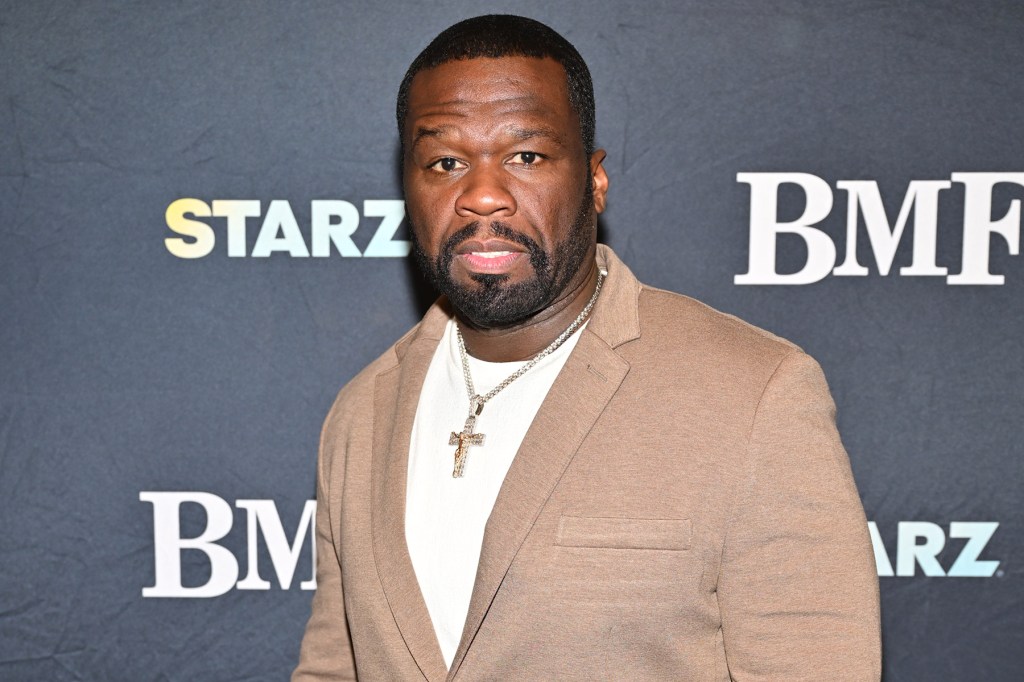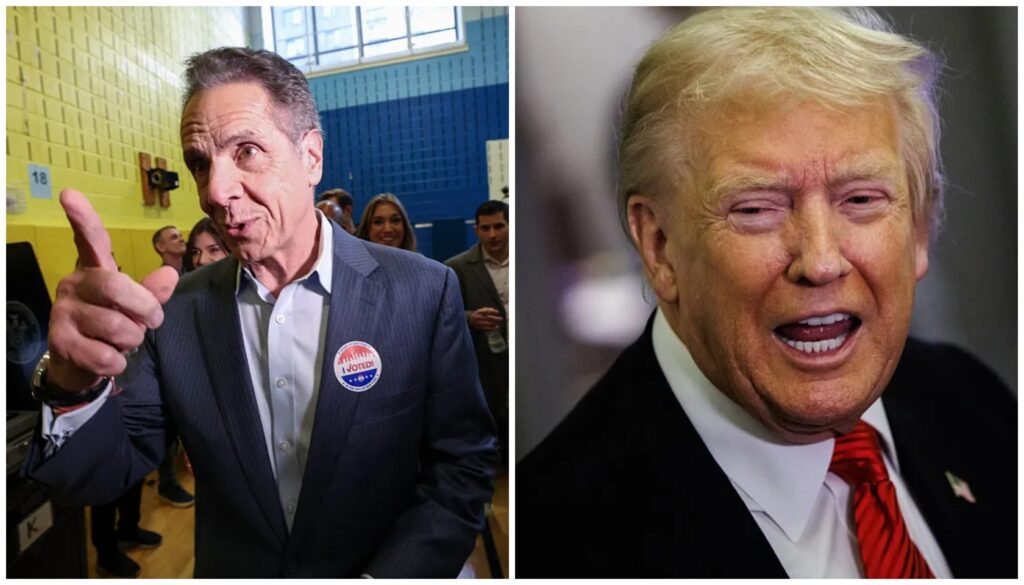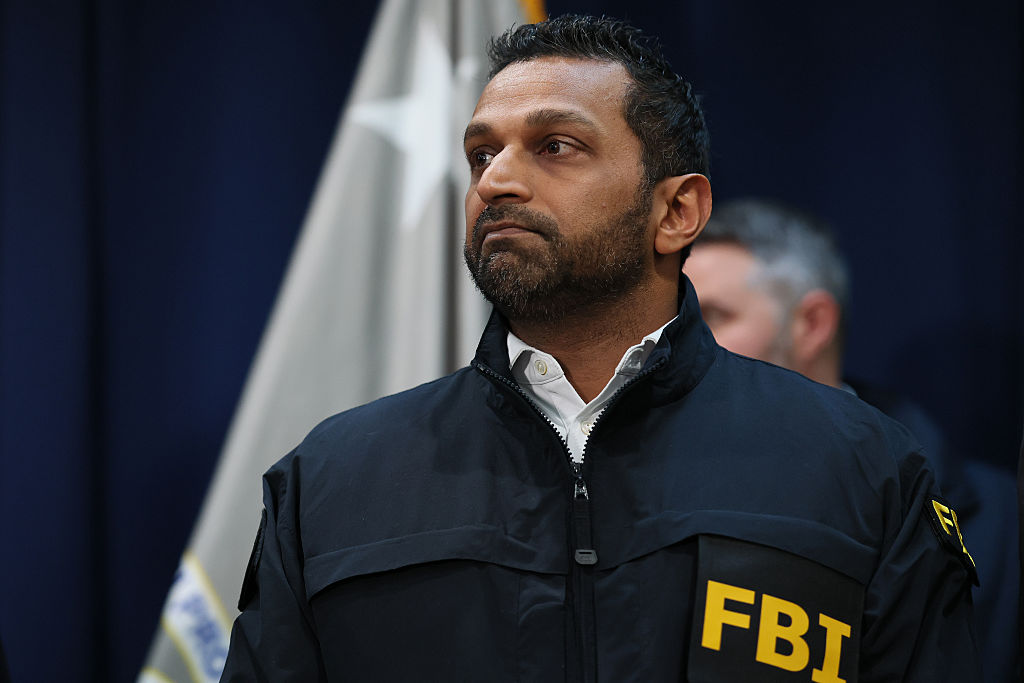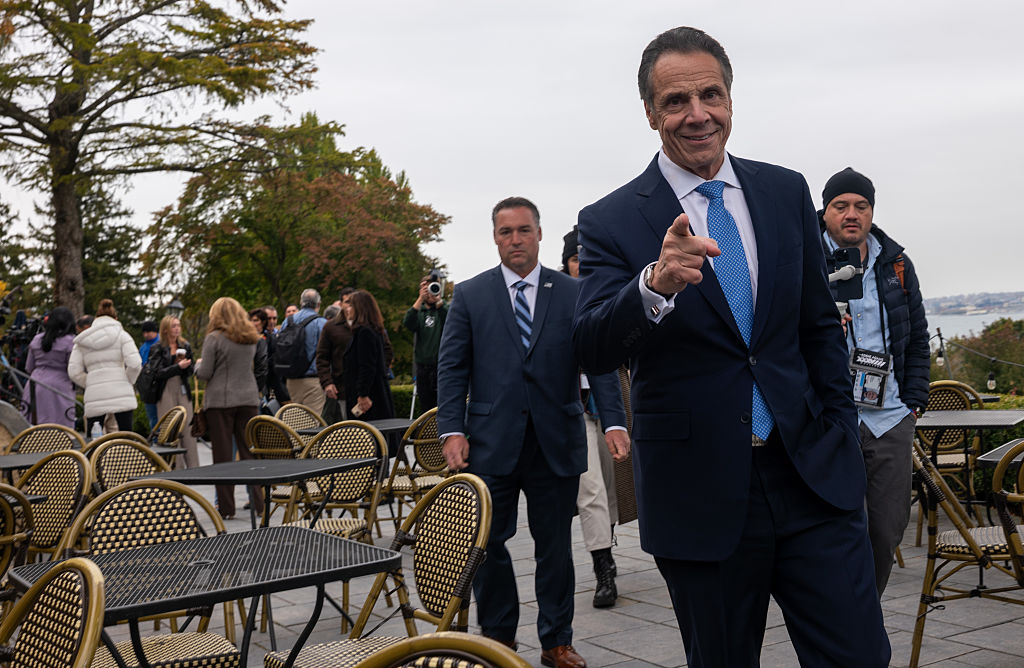politics
Page: 4
50 Cent is sick and tired of airports in the United States being outta control. In recent posts on Instagram, the rapper shared his frustration with major delays and flight cancelations happening across the country due to the government shutdown.
His first post on Sunday (Nov. 9) was of a news montage of clips filmed at airports overrun with frustrated travelers, helplessly packing in like sardines. A headline attached to the video reads, “More Than 700 Flights Cancelled Across the Nation Due to Shutdown.”
“Man the airport is f–ked up, for get about traveling right now!” 50 wrote in his caption.
The G-Unit icon then followed up with a video showing his own POV on the situation, filmed as he deplanes a private jet that wasn’t allowed to take off — possibly due to the lack of air traffic controllers showing up for work as a result of President Donald Trump’s shutdown-mandated cuts to U.S. air travel. “It’s a wrap, man,” says 50, wearing a furry jacket and New York Yankees cap. “Can’t even take off in jets no more, they just said they’re not even letting the jets go.”
“Im headed back to Shreveport this ain’t it,” he captioned the clip. “Bad Travel day!”
Over the past few days, thousands of flights have been canceled across some of the biggest metropolitan airports in America. CNN reports that more than 1,000 departures were canceled on Friday (Nov. 7) alone, while 4,500 others were delayed.
The disarray comes amid the longest government shutdown in U.S. history, which began on Oct. 1. One of the many effects of this pause has been a 4% reduction in trips flying to and from the 40 busiest airports in America, as required by the Federal Aviation Administration.
With his travel plans on hold, it sounds like 50 is going to spend more quality time in Shreveport, La., where he opened his G-Unit Studios in April 2024. A New York native, the hip-hop legend also recently criticized another governmental change, taking issue with the election of Zohran Mamdani as mayor of the city earlier in November.
“I think his intentions are good,” 50 wrote on Instagram of the politician, sharing and deleting memes indicating his disappointment with the election results. “But his Tax plan is gonna run the big money out of the city and if he defunds the police they are gonna purge. @50centaction All Roads lead to SHREVEPORT !”
See 50 Cent’s video from his recent negative experience with air travel below.
Do you get deja vu? Donald Trump‘s administration has once again been slammed by an artist for using their music without permission, this time receiving a comment from an unhappy Olivia Rodrigo after the White House and Department of Homeland Security shared a video set to one of her songs.
The controversial clip in question was shared in a joint Instagram post on Tuesday. Soundtracked by “All-American Bitch,” the opening track on the pop star’s Billboard 200-topping sophomore album, Guts, the video shows United States Immigration and Customs Enforcement officers forcibly tackling, detaining and deporting people.
It then cuts to a montage of supposed immigrants voluntarily boarding flights organized by the DHS, smiling and giving thumbs up as they go. “LEAVE NOW and self-deport using the CBP Home app,” the caption reads. “If you don’t, you will face the consequences.”
In the comments, Rodrigo wrote, “don’t ever use my songs to promote your racist, hateful propaganda.”
Billboard has reached out to the White House and ICE for comment.
It’s unclear why the government would want to use a song by the three-time Grammy winner. Not only has Rodrigo been vocal in her opposition to Trump, endorsing his opponent Kamala Harris in the 2024 election, but she’s also specifically called out his harsh crackdown on immigration by way of ICE raids this past year.
“I’ve lived in LA my whole life and I’m deeply upset about these violent deportations of my neighbors under the current administration,” she wrote on her Instagram Story in June. “LA simply wouldn’t exist without immigrants. Treating hardworking community members with such little respect, empathy, and due process is awful. I stand with the beautiful, diverse community of Los Angeles and with immigrants all across America. I stand for our right to freedom of speech and freedom to protest.”
That said, Trump’s administration is famous for using music without artist permission at this point. In the past few weeks alone, Kenny Loggins slammed the twice-impeached POTUS for pairing “Danger Zone” with an AI-generated video of himself dumping feces on “No Kings” protestors, and Swifties called out the White House for making a TikTok set to Taylor Swift’s “The Fate of Ophelia.” (The pop star herself didn’t comment on the issue, but given her long history of clashing with Trump, it’s probably safe to say she didn’t give him the green light.)
Trending on Billboard
50 Cent isn’t the biggest fan of New York City’s new mayor Zohran Mamdani.
After Mamdani’s historic win as the city’s first Muslim and South Asian mayor, the Queens rapper and filmmaker took to Instagram to voice his displeasure in a series of posts, some of which have since been deleted.
In one deleted post, he posted a picture of a red Yankee fitted cap and a bottle of his Branson cognac with the caption: “New York is over pack it up, let’s go! THE MAN’S First job is Mayor MAMDANI run New York. … I need a drink!” He then posted what looks like an AI-generated image of a tombstone that reads, “RIP NYC, Founded 1624, Died 2025.”
50 also posted a clip from Mamdani’s victory speech, in which the newly elected mayor took aim at President Trump. “3 words,” he wrote in the caption of the deleted post. “No funding coming! NYC finished.”
And finally, in yet another deleted post, 50 posted a screenshot of a tweet from journalist and host Ari Melber that said Mamdani played Ja Rule‘s “New York” as he was walking to the podium to give his speech. “Of course he would walk out to that fool,” 50 wrote. “His plan doesn’t effect him. He ain’t getting no money.”
Speaking of Ari Melber, New York City’s new mayor-elect appeared on his CNN show The Beat With Ari Melber and was asked about the back-and-forth the two Queens natives have had over his tax policy. “What I would say to you, 50, if you are indeed watching or anyone else who’s watching this show,” he said. “I continue to think that having the top 1 percent of New York City who are making more than a million dollars a year, having them pay 2 percent more for an economic agenda that would transform every New Yorker’s life, including their own, is something that is worthwhile.”
Mamdani added that he plays one of 50’s best songs whenever he gets a death threat. “Even though we have a disagreement on tax policy,” he began, “Every time I get a death threat, I still listen to ‘Many Men.’ It’s true.”
50 posted the clip (still up), and while he said he feels like Mamdani’s heart is in the right place, he still thinks taxing the rich will make corporations flee the city and that defunding the NYPD is going to lead to a purge, before hinting at the G-Unit Studios he leased in Shreveport, Louisiana, in 2024. “I think his intentions are good,” he wrote. “But his Tax plan is gonna run the big money out of the city and if he defunds the police they are gonna purge. @50centaction All Roads lead to SHREVEPORT !”
Zohran Mamdani was born in Uganda but moved to New York City when he was 7 years old and grew up in Queens. Before running for mayor, he was an assemblyman for New York’s 36th State Assembly district, which represented the Queens neighborhood of Astoria and Long Island City.

There are a lot of happy New Yorkers out there celebrating the victory of Zohran Mamdani in the 2025 mayoral race, and some of them — including Gracie Abrams, Halsey and more — are also big-name musicians.
In response to the 34-year-old Democratic Socialist triumphing over opponents Andrew Cuomo and Curtis Sliwa after the election wrapped up Tuesday night (Nov. 4), numerous stars shared messages of excitement and congratulations on social media. Abrams shared a number of posts about Mamdani’s win on her Instagram Story, writing that she was “SCREAMING” and adding, “I keep getting chills over and over.”
On X, Halsey wrote, “I just got off stage from an AMAZING show and Zohran Mamdani is mayor of New York and I am NOT GONNA BE ABLE TO SLEEP I’m too ALIVE!”
Lorde also weighed in, sharing a “New York” graphic on her Story and typing, “Change … Have a Nice Day” while tagging Mamdani’s account.
All three of those singer-songwriters are based in NYC, which showed up for Mamdani on Election Day with more than 1,036,051 ballots cast in his favor, according to The Associated Press. Running on a platform of lowering the cost of living in the city, the assemblyman earned an estimated 50.4% of the vote, while Cuomo and Sliwa split the rest 41.6% and 7.1%, respectively.
Many other musicians celebrated the results in the comments of Mamdani’s posts on Instagram with Clairo dropping a fire emoji and Lizzy McAlpine writing, “YAYYYY.”
“he’s home!” Rachel Zegler replied, while King Princess commented, “I think we should throw a party ?”
Lauren Jauregui chimed in, “thank God!! May you be protected and guided!! Yayyyy!”
The outpouring of happiness in response to Mamdani’s win reflects the unprecedented grassroots momentum he was able to curate with his campaign. Backed by politicians such as Bernie Sanders and Alexandria Ocasio-Cortez, the Ugandan-born immigrant leaned into social media strategy and pop culture throughout the race, at one point coming out on stage during PinkPantheress’ October concert in Brooklyn.
Mamdani also got himself in the good graces of Swifties by shouting out Taylor Swift’s “Only the Young” — as well as “Hate It or Love It” by The Game featuring 50 Cent and “Right Above It” by Lil Wayne featuring Drake — when he was asked to summarize his campaign in three songs.
Detroit City Council President Mary Sheffield made history in Detroit on Tuesday (November) after she was elected as the first woman mayor of the Michigan city. Mayor-elect Mary Sheffield will utilize her political expertise to shed light on the needs of Detroit residents, promising equity and inclusion during her victory speech.
Mary Sheffield, 38, earned a commanding win over her challenger, Triumph Church Pastor Solomon Kinloch, Jr., to the tune of 77 to 23 percent of the vote, as reported by the Detroit Free Press.
“I am told it was the largest margin (of victory) in the history of the city of Detroit,” Sheffield said to a group of reporters before her speech. “I feel like today was a mandate by our city. Everyone is going to have a seat at the table with this administration.”
During a spirited victory speech, Sheffield noted the historic significance of her win and thanked the city for backing her vision.
“Tonight, our city adds another chapter to its great history. Throughout Detroit’s 324-year history, 75 mayors have led this city. Not one has been a woman. But tonight, Detroit, we know that changes. And you changed it, Detroit,” Sheffield said from Detroit’s MGM Grand.
Mary Sheffield previously served 12 years as a member of the city council ahead of announcing her mayoral bid in 2023.
—
Photo: Getty
Trending on Billboard
Some Taylor Swift fans are up in arms over a video on the official White House TikTok account set to “The Fate of Ophelia” — and many of them are encouraging the pop superstar to take legal action against President Donald Trump.
The Monday (Nov. 3) TikTok video pairs Swift’s The Life of the Showgirl lead single — currently in its fourth week at No. 1 on the Billboard Hot 100 — with images of Trump and his associates. One frame shows Trump’s mug shot while Swift sings, “Don’t care where the hell you’ve been.” The video ends with a photo of the president scooping McDonald’s French fries under a slightly altered lyric reading, “The fate of America.”
Related
Swift has not commented on the post, but it’s unlikely that she’s happy about it. Historically, the star has not pledged her allegiance to Trump’s team; she’s only endorsed Democrats, including Kamala Harris in the 2024 election, and Trump, in turn, has insulted Swift repeatedly, including by posting “I HATE TAYLOR SWIFT” after the Harris endorsement.
In the TikTok comments, some Swifties are putting on their lawyer hats. “TAYLOR SWIFT SUE THEM FOR USING YOUR SONG!” wrote one. “I would absolutely LOVE if Tay found a way to sue them for this,” wrote another. “One freaking huge lawsuit on the horizon,” another prediction read.
Is the White House’s use of “The Fate of Ophelia” legal? Probably not. While individual TikTok users can soundtrack their videos with pre-cleared songs, commercial entities are required to obtain so-called sync licenses from copyright owners. The White House did not return an inquiry on Tuesday (Nov. 4) as to whether they got a sync license for the post, but given Swift’s public rebukes of Trump, and the fact that the singer is famously protective of her catalog, it’s unlikely that she greenlit such a license.
Related
As Billboard previously reported during Zach Bryan’s public scuffle with the Trump administration over its use of his track “Revival” in an X post, there are a number of legal avenues for artists to take when their songs are used on social media without licenses. Swift’s lawyers could send a cease-and-desist letter to the White House, or they might lodge a formal takedown notice directly with TikTok under the Digital Millennium Copyright Act.
If these administrative procedures are unsuccessful, Swift could indeed bring a formal lawsuit against the federal government for copyright infringement. She’s no stranger to intellectual property litigation, having both faced copyright claims herself and gone on the legal offense over the years.
However, it’s hard to imagine Swift taking the drastic step of suing the White House. The courts are public by nature, and Swift has a carefully maintained image. This is especially true in the political arena, where the singer’s statements have always been measured (“The choice is yours to make,” she told fans in her post endorsing Harris last year).
Related
Swift, therefore, may not want to become publicly embroiled in what would almost certainly be viewed as a partisan legal battle. Nothing is certain, though, and only time will tell.
Swift’s reps did not return a request for comment on the matter.
Getty Images / Andrew Cuomo / Donald Trump
Andrew Cuomo is not trying to answer any questions about President Donald Trump’s reluctant ringing endorsement.
Democratic Socialist Zohran Mamdani is on the verge of shaking up the political landscape in NYC, and even has the Supreme MAGA Lord, and bum from Queens, Donald Trump, so spooked that he’s throwing his support behind Andrew Cuomo, his one-time nemesis during his first awful term as POTUS.
Cuomo is running as an Independent after Mamdani easily secured the Democratic nomination in the primary, which eventually led to current Mayor/socialite Eric Adams’ dropping out of the race and also throwing his support behind Cuomo, in hopes of stopping Mamdani from becoming Mayor, which is looking like a futile effort because polls still show Mamdani ahead.
Ahead of Tuesday’s election, Cuomo called into Hot 97’s Ebro In The Morning show to make his last pitch to New Yorkers who are probably still on the fence about voting for either him or Mamdani. Still, it turned out to be a disaster after Ebro Darden asked the former New York Governor about Trump endorsing him.
“Your boy was just on ’60 Minutes,’ Cuomo, saying you’re his guy,” Darden told Cuomo.
Cuomo responded, “No.”
Ebro pressed him again, “Trump said you’re his candidate! If he had to pick a bad Democrat or a… communist, he’s picking you!”
Several seconds of silence followed, with Peter Rosenberg finally saying he thinks Cuomo ditched the interview, adding that he heard a “click,” suggesting the Mayoral hopeful hung up on them.
Andrew Cuomo Isn’t Making A Great Case For Himself
This latest woeful interview followed his other flop on MSNBC, where he mixed up the two Black hosts after claiming “diversity is a weakness.”
Bruh.
We hope y’all are out there exercising your right to vote. So far, there has been a record turnout for early voting in NYC.
You can see more reactions to Cuomo’s latest interview and other moments leading up to election day below.
Zohran Mamdani is a known Kendrick Lamar fan, and showed his support for the rapper over Halloween weekend. With New York City’s mayoral election set for Tuesday (Nov. 4), Mamdani — who is running to lead the city — made campaign stops at various night clubs around the city over the weekend. One video making […]
Michael M. Santiago / Kash Patel
Did Kash Patel embellish the FBI breaking up an alleged Halloween terror plot? A Michigan lawyer sure does believe so.
Mr. “I’ll see you in Valhalla,” and our current DEI FBI Director, Kash Patel, is being accused of lying about his FBI thwarting a terror plot that was supposed to go down on Halloween.
According to the Associated Press, a Michigan defense lawyer, Amir Makled, is disputing Patel’s claims that his 20-year-old client and four other young people were going to enact a terror attack on Halloween weekend.
Pattel proudly announced on Friday, teasing that more information was coming, but as expected with this administration, shared few details about the case.
Per The Associated Press:
The investigation involved discussion in an online chat room involving at least some of the suspects who were taken into custody, according to two people briefed on the investigation who could not publicly discuss details. They spoke to The Associated Press on condition of anonymity. The group allegedly discussed carrying out an attack around Halloween, referring to “pumpkin day,” according to one of the people. The other person briefed on the investigation confirmed that there had been a “pumpkin” reference.
Makled Believes No Charges Will Be Pressed
Makled is calling CAP on those claims with the news website reporting that he has not received any details from federal authorities, while his client, a man from a Dearborn, Michigan suburb, still sits in prison.
After reviewing the investigation details, he feels there was no terror plot and is going so far as to say no charges will be brought when it’s all said and done.
This latest controversy isn’t the first time Patel has seemingly jumped the gun on an active investigation. Following his “good friend,” Charlie Kirk’s assassination, the highly unqualified FBI Director claimed that the shooter was in custody, but that was not the case, and he was called out for his handling of the investigation.
Did Kash Patel Bring Up This Alleged Halloween Terror Plot To Take The Focus Off His Company Jet Abuse?
Interestingly enough, Patel dropped this news as he was being called out for abusing FBI jet use, most recently for using the company plane to see his girlfriend sing the national anthem at a wrestling event.
According to reports, Patel was so upset that the info got out, he fired the FBI official, a 27-year vet.
Social media isn’t buying what Patel is selling either, and they are still calling out for his blatant abuse of our tax dollars.
You can see more reactions below.
If you wanted an example of how to fumble badly in a press interview, former New York Governor Andrew Cuomo provided that in an appearance on Saturday (November 1) during The Weekend on MSNBC. In speaking with hosts Eugene Daniels, Jonathan Capehart, and Jackie Alemany, Cuomo spoke about his positions on issues affecting New Yorkers as a mayoral candidate. When asked about Islamophobic rhetoric directed towards Democratic candidate Zohran Mamdani, Cuomo denounced it before making a statement.
“Our diversity is our strength, but it can also be a weakness,” he began. “So you have to work very, very hard to make sure you’re always keeping people united, and there’s always flare-ups among different races, religions, creeds for one reason or another.” Daniels offered a follow-up question asking what he meant by “weakness.”
Cuomo then replied, “Diversity can be a weakness if you have antipathy among groups, Jonathan. If you have racism or anti-semitism, et cetera. Then you’ve have friction.” After the camera caught Capehart’s perplexed reaction, Daniels would interject during Cuomo’s response to correct him: “I’m Eugene.” Daniels and Capehart are both Black.
Love Hip-Hop Wired? Get more! Join the Hip-Hop Wired Newsletter
We care about your data. See our privacy policy.
There would be another moment toward the end of the interview where Cuomo mixed up the two again, this time in an answer to Daniels about comparing his legacy as part of a political dynasty with his father, Mario Cuomo, as opposed to people wanting new blood like Mamdani.
“The mayor is an important job and people want to be safe,” Cuomo began. “People want affordable housing, and in New York City, you can have a crisis at any given time. I don’t think they want a mayor who has no experience or ability to do the job. It can be a scary city as you know, Jonathan, and you want someone in that seat who can handle whatever comes up.”
Capehart cut in as he and Daniels laughed at the repeated error, letting Cuomo know that he was speaking to him now instead of Daniels. Cuomo apologized meekly as the interview wound down, saying, “I’m sorry.” Cuomo spokesperson Rich Azzopardi blamed the gaffes on the candidate being “in a mobile van unit with an earpiece and staring directly into the camera and couldn’t tell who was talking.”
The interview comes as 700,000 people in New York City have already voted early, leading up to the official election day on Tuesday (November 4).
—
Photo:

 State Champ Radio
State Champ Radio 






